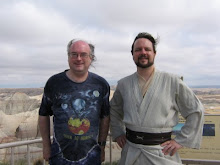Monday, July 04, 2011
The Moral Equivalent of Religion
One of the great unappreciated facts of life in the United States is that we don't need religion. We have something just as good.
What is religion for (besides enriching the ruling class)? It binds a people together in common beliefs. It provides a basis for morality. It inspires people to strive to achieve the best within themselves.
Here in the U.S. we have a secular, civil equivalent, and today is the day we celebrate that equivalent.
I'm talking about the American Mythology that we all learn in elementary school. The Mayflower. The Founding Fathers. The Revolution. The Presidency, Congress, and Supreme Court. Fort McHenry, the Stars and Stripes. Civil Rights.
This moral equivalent of religion has its scriptures: The Declaration of Independence, the Constitution (including amendments), the Gettysburg Address, and all the rest. (It has been said that the Constitution is the heart of the nation, but the Declaration is its soul.) It has its demigods and saints: Adams, Franklin, Jefferson, Washington, Lincoln, FDR, etc.
Most of all, this secular, civil system has its morality: the equality of all people, their possession of inalienable rights, the usefulness of separate states working together in peace, respect for individual and regional differences. A belief in the principles of the Enlightenment: rationality and the elevation of objective truth over emotion and deception. Universal literacy and education. Life, liberty, and the pursuit of happiness.
Also like religion, our civil system has also been used in the past to perpetrate evil: genocide of native Americans, subjugation of minorities, cruel war, perpetration of poverty and misery at home and around the globe.
The Christianists are always telling us that this is a Christian nation, founded on Christian values. They are wrong. This is an American nation, founded on American values -- and anyone who believes differently, anyone who places God (Jehovah, Allah, or whatever) above our shared American beliefs, is guilty of treason against the nation.
Fortunately, our civil system is distinct from religion in one respect: We don't kill those who believe differently, just because they disagree. (We may kill them for other reasons, particularly if we can make more money that way, but that's beside the point.)
Maybe we should start thinking about making an exception in some cases....
Subscribe to:
Posts (Atom)
